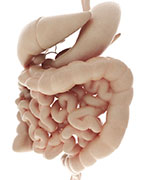- Could Your Grocery Store Meat Be Causing Recurring UTIs?
- Are You Making This Expensive Thermostat Error This Winter?
- Recognizing the Signs of Hypothyroidism
- 10 Strategies to Overcome Insomnia
- Could Artificial Sweeteners Be Aging the Brain Faster?
- Techniques for Soothing Your Nervous System
- Does the Water in Your House Smell Funny? Here’s Why
- Can a Daily Dose of Apple Cider Vinegar Actually Aid Weight Loss?
- 6 Health Beverages That Can Actually Spike Your Blood Sugar
- Treatment Options for Social Anxiety Disorder
Slowed Growth Could Signal Crohn’s Disease in Kids

A lag in growth could be a sign that a child might suffer from undiagnosed inflammatory bowel disease (IBD), especially Crohn’s disease, one pediatric doctor says.
“Growth charts are one of the most important things we look at with children because sometimes a slower growth rate is the only sign of IBD, especially with Crohn’s disease,” Dr. Marc Schaefer, a pediatric gastroenterologist, said in a Penn State University news release.
Other symptoms of inflammatory bowel disease in children include not wanting to eat, persistent stomach pains, and diarrhea or bloody stools, said Schaefer, who works at Penn State Hershey Children’s Hospital in Hershey, Pa.
Children with these symptoms should be evaluated, he suggested.
Blood tests and endoscopy are also used to diagnose and to distinguish Crohn’s from ulcerative colitis, another type of inflammatory bowel disease that causes rectal bleeding, Schaefer added.
The causes of Crohn’s and ulcerative colitis aren’t clear, but it is known that family history plays a role.
“If a family history of IBD is present, there is an increased risk for a child to get it, but it’s not definitive. It is difficult to predict,” Dr. Tolulope Falaiye, also a pediatric IBD specialist at Penn State Hershey, said in the news release.
Even within families, symptoms and severity of the disease can vary widely. While some people manage to control the condition for a long time after the first flare-up, others have recurrences.
“We always tell families it is a lifelong condition,” Schaefer said.
Certain foods or a stomach bug can trigger symptoms in some people with inflammatory bowel disease, but there is no special diet that cures it, he said. Treatments include medications and, in some patients with ulcerative colitis, removal of the colon.
“We really individualize the treatment and tailor it to each patient,” Schaefer said in the news release. “We have to factor in results of endoscopies as well as the severity and behavior of the disease. What might work for one patient may not be best for another.”
More information
The Crohn’s and Colitis Foundation of America has more about inflammatory bowel disease.
Source: HealthDay
Copyright © 2026 HealthDay. All rights reserved.










